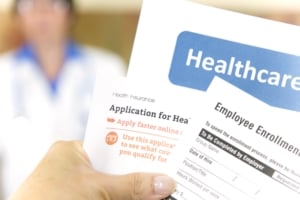The average life expectancy in the United States is rising at a rate where the number of people 65 years or older is expected to increase 26% by 2040. This rapid increase in the elderly population will play a large role in the transformation of our healthcare system for the foreseeable future.
A direct result of this is an increase in demand for qualified healthcare professionals to provide quality care to the elderly population. At this point in time, there is an immense demand for most healthcare disciplines across all settings.
Understanding the hiring process on a deeper level may help you secure a job faster. As you begin your healthcare industry job search, here are a few things you need to know.
6 Tips to Improve Your Healthcare Job Search
1. Preparing Your Healthcare Job Applications
Modern job applications are much more complicated and time-consuming than those of the past. Many employers now use an applicant tracking system (ATS) to handle large volumes of applications. This involves a software program which scans submitted resumés for relevancy and candidate potential.
Say that you are applying for a position as a paramedic, the ATS software will be looking for information like certifications, training, and work experience using keywords and phrases. In this case, you would want to include things like “EMS license” and “CPR certification” in your resumé.
You should also submit a cover letter wherever possible. Although not all recruiters read them, they can easily make you stand out. This is because many applicants do not take the time to write or submit a cover letter with their application. At a minimum, here are some other things you should do to prepare your applications:
- Use active voice to eliminate filler words and make your application sound more direct.
- Include metrics that give a clear action and result.
- Only submit a one-page resume, as recruiters are unlikely to read multiple pages.
- Choose a simple resume layout and design which gives a more professional and uncluttered look.
- Keep your writing straightforward by using simple vocabulary.
For the healthcare industry specifically, you want to demonstrate your commitment to your work. Since many of these jobs require unique or long hours, it is important that the potential employer sees you as an investment. Be very up front in your application. If you are unwilling to relocate, say so from the beginning. This will save the employer time and ensure that you only devote energy to applications that might lead somewhere.
At Ascendo Resources, we have recruiters who came directly from the healthcare industry and have extensive networks within, making us a great option for finding healthcare careers.
2. Network, Network, Network
Networking will always be an excellent way to get your foot in the door, and with sites like LinkedIn, it is easier than ever to connect with healthcare professionals around the world. Try to connect with people at the places you want to apply for, then use their names when you apply. “John Smith recommended that I apply for this position.”
3. Augment and Acquire Professional Skills
Whether you are in between jobs or you are looking to advance your career, job hunting is the perfect time to focus on continuing your education. It is an excellent way to show prospective employers how invested you are in continuing to learn and grow as a healthcare professional.
4. Do Plenty of Research
One key mistake many people make when searching for healthcare jobs is not doing enough research before applying for positions. While it may seem like a hassle, spending time researching now can save you – and your potential employer – time down the road. Here are some things you should research before applying for any healthcare position.
Are You Qualified?
In the highly competitive healthcare industry, why waste your time applying for positions you are not qualified for? Make sure you check the qualifications of each position and be honest with yourself about whether you meet them before applying.
Are You Interested in the Position?
Just because you are qualified for a position does not mean you will actually enjoy it. Take some time to learn about the company and role before applying. If you make it all the way to the interview before realizing you do not want the job, you have wasted your time and that of the potential employer.
5. Follow Up
Send a “Thank you” email to everybody who interviewed you within 24 hours. Thank them for their time, add in details about what you learned during the interview, and tell them that you are still interested in the position and look forward to hearing back from them. Keep it short.
6. Use a Recruiter
Recruiters can connect you with healthcare jobs that are not advertised anywhere else, and their entire job is to connect employers with the perfect employees.
At Ascendo Resources, our healthcare recruiters have experience working in the industry, so they know all the ins and outs of applying for jobs in the field. Contact us today to find out how we can help connect you with the healthcare job of your dreams.
Healthcare Job Search Expenses
Physicians, unlike many other professionals, sometimes must pay to submit applications. According to the American Medical Association (AMA), medical school applicants can spend nearly $1000 or more applying to programs.
Once you have graduated school or gotten the correct certifications for the healthcare job you want, you may consider spending money to help advance your job search. If you are unsure of how to proceed or what to focus on, hire an Ascendo Healthcare recruiter to help you streamline the process. You will want to determine your budget before you start spending money on job search resources. These can add up quickly, and you want to make sure that your investment pays off.
Travel
Some potential employers may pay for relocation expenses while others may not. If you are searching for healthcare jobs in another state, make it a point to ask about this. When it comes down to two options in the same area, you may find that one employer is willing to relocate you. Chances are that the employer may only cover a certain percentage of your moving costs. Determine a budget for fees like truck rentals, packing materials, and gas so that you can plan ahead.
During the job search, you may also have expenses for the interviews themselves. With the rise of Zoom and other long-distance video conferencing technology, it is less common to travel for job interviews. Try to limit travel expenses when you can. This helps you save both money and time.
Fees
If you are new to the healthcare industry, you may have fees to get the proper documentation you need. Examples include certification costs, licensing fees, and equipment costs. For example, an optometrist may need to pay a fee to obtain an optometry license.
If you plan on practicing or working in multiple states, these fees may double. During the job search, make sure you ask the employer whether they pay for these fees or whether you need to obtain the proper materials before applying.
Healthcare Jobs at Ascendo
At Ascendo Resources, we specialize in finding jobs for healthcare professionals. We offer help searching for full-time, temporary/contract, and part time positions.
No matter what level position you are looking to secure, our team can help you during the hiring process. Through our connections in the healthcare industry, we get our clients’ resumes in front of potential employers faster. As we work to fill the position, we will notify you if your application fits the needs of our corporate partners.
To get started right away, contact our healthcare recruiters today!















